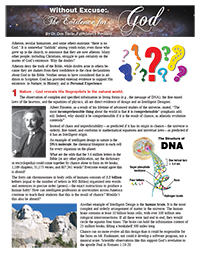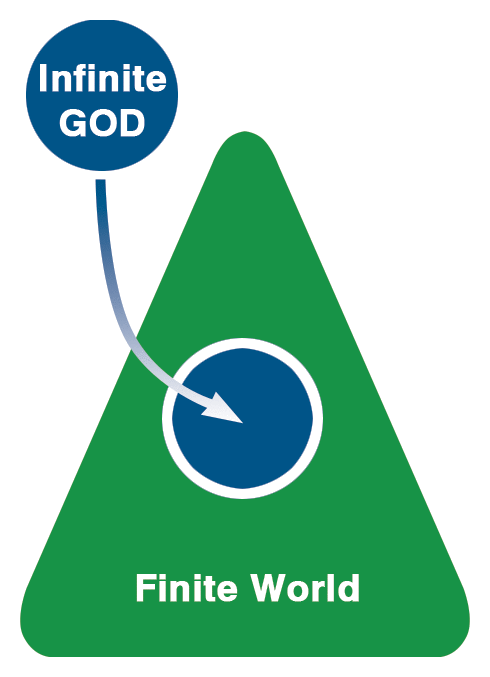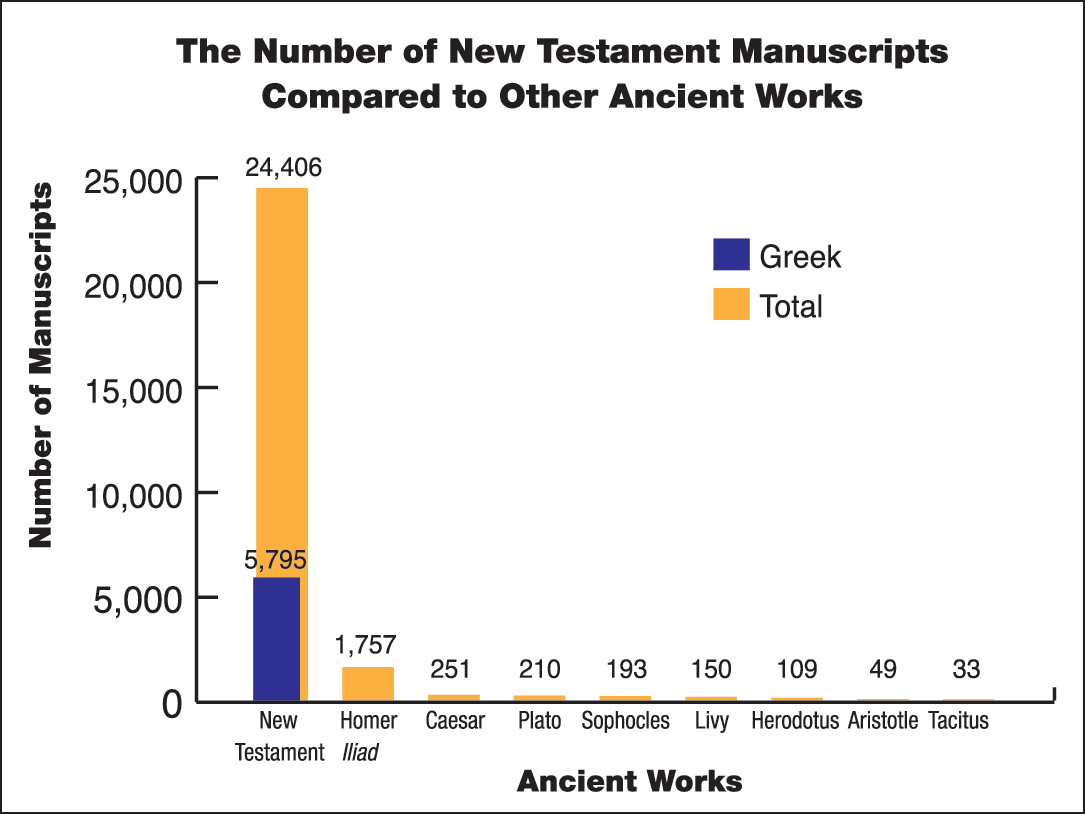The Evidence for God

(This content is available for purchase in a 25-pack, and as a printable PDF.)
 Atheists, secular humanists, and some others maintain “there is no God.” It is somewhat “faddish” among youth today, even those who grew up in the church, to announce that they are now atheists. Many other people, including Christians, struggle to gain certainty on the matter of God’s existence. Why the doubts?
Atheists, secular humanists, and some others maintain “there is no God.” It is somewhat “faddish” among youth today, even those who grew up in the church, to announce that they are now atheists. Many other people, including Christians, struggle to gain certainty on the matter of God’s existence. Why the doubts?
 Atheists deny the truth of the Bible, while doubts arise in others because they are shaken from their confidence in the clear declarations about God in the Bible. Neither seems to have considered that in addition to Scripture, God has provided external evidence to support His existence: in Nature; in History; and in Personal Experience.
Atheists deny the truth of the Bible, while doubts arise in others because they are shaken from their confidence in the clear declarations about God in the Bible. Neither seems to have considered that in addition to Scripture, God has provided external evidence to support His existence: in Nature; in History; and in Personal Experience.
1. Nature – God reveals His fingerprints in the natural world.
The observation of complex and specified information in living forms (e.g., the message of DNA); the fine-tuned laws of the heavens; and the equations of physics; all are direct evidence of design and an Intelligent Designer.
 Albert Einstein, as a result of his lifetime of advanced studies of the universe, stated, “The most incomprehensible thing about the world is that it is comprehensible” (emphasis added). Indeed, why should it be comprehensible if it is the result of chance, as atheistic evolution contends?
Albert Einstein, as a result of his lifetime of advanced studies of the universe, stated, “The most incomprehensible thing about the world is that it is comprehensible” (emphasis added). Indeed, why should it be comprehensible if it is the result of chance, as atheistic evolution contends?
Instead of chaos and unpredictability—as predicted if it has its origin in chance—the universe is orderly, fine-tuned, and conforms to mathematical equations and universal laws—as predicted if it has an Intelligent origin.
 An example of intelligent design in nature is the DNA molecule, the chemical blueprint in each cell for every organism on the planet.
An example of intelligent design in nature is the DNA molecule, the chemical blueprint in each cell for every organism on the planet.
What are the odds that the 3.6 million letters in the Bible (or any other publication, say the dictionary or encyclopedia) could come together by chance alone to form its 66 books; 1,189 chapters; 31,173 verses; and 807,361 words? Everyone would agree this is absurd!
The forty-six chromosomes in body cells of humans consists of 3.2 billion letters (equal to the number of letters in 900 Bibles) organized into words and sentences in precise order (genes)—the exact instructions to produce a human baby! How can intelligent professors in universities across America continue to teach their students that this is the result of chance? Wouldn’t this also be absurd?
Another example of Intelligent Design is the human brain. It is the most complex and orderly arrangement of matter in the universe. The human brain contains at least 10 billion brain cells, with over 100 trillion neurological interconnections. If all these were laid end to end, they would circle the equator four times. The brain can hold the information content of 25 million books, filling a bookshelf 500 miles long.
 Chance can no more evolve all this design than it could be responsible for the faces on Mt. Rushmore; nor could it develop a software program, nor a musical score. Scientific observations like this support God’s revelation to the apostle Paul in Romans 1:19-20:
Chance can no more evolve all this design than it could be responsible for the faces on Mt. Rushmore; nor could it develop a software program, nor a musical score. Scientific observations like this support God’s revelation to the apostle Paul in Romans 1:19-20:
…what may be known about God is plain to them… For since the creation of the world God’s invisible qualities—his eternal power and divine nature—have been clearly seen, being understood from what has been made, so that men are without excuse.
Other biblical passages which affirm the evidence of God’s fingerprints in nature include: Job 12:7-10; Psalm 8; 19:1-4; 136:4-9; Jeremiah 5:21-24; Acts 15:16-17.
It should be noted that the external argument from scientific observations of nature do not reveal WHO God is, only that He must exist as an intelligent Creator. The knowledge of God’s identity (name) must come from another external evidence, namely, God’s fingerprints in history. That evidence will be discussed in the next section.
2. History – God reveals His fingerprints in the historical record.
The prophet Isaiah, speaking prophetically by the Holy Spirit, declared, “The people who walk in darkness will see a great light… For a child will be born to us, a son will be given to us… And His name will be called Wonderful Counselor, Mighty God, Eternal Father, Prince of Peace” (Isaiah 9:1, 6).
The prophet Micah added that the origin of this “light” is “from the days of eternity” (Micah 5:2).
A major problem exists in the history of humanity and for every religion on earth: The knowableness of God. The Gospel writer, the apostle John, states that “No one has ever seen God at any time…” (John 1:18). The evidence from nature has persuaded most of humanity THAT a supreme being must exist (Psalm 19:1-4; Romans 1:18-20) but since they can’t see, hear, or touch this supreme being, they can’t discover WHO God is.
As a result, all the world’s religions have concluded that while they agree that “god” exists, He is distant, abstract, and His identity is not knowable. Thus, Brahman of Hinduism, and Allah of Islam, cannot be described with personal metaphors (e.g. “good shepherd”) or any personal qualities (e.g. God is “love”).
There is a cavernous space between “god” and man which is not humanly bridgeable because we do not even know WHO god is.
 Imagine that a triangle represents the finite world and a circle represents infinite God. People in the triangle (world) know there must be a circle (God) because of the evidence of nature within the triangle; but the circle remains outside the triangle–invisible, intangible, and eternally illusive.
Imagine that a triangle represents the finite world and a circle represents infinite God. People in the triangle (world) know there must be a circle (God) because of the evidence of nature within the triangle; but the circle remains outside the triangle–invisible, intangible, and eternally illusive.
However, in history, about 2,000 years ago, the advent of one person was announced by angels actually to be the very circle (God): “…and they shall call His name ‘Immanuel’, which translated means, ‘God with us.’”
He Himself affirmed this in His trial before the Sanhedrin, who asked Him, “‘Are you the Son of God then?’ And He said to them, ‘Yes, I am’” (Luke 22:70). The Christian claim is that the circle (infinite God) came into the triangle (finite world) in objective history.
One person, who was with Jesus throughout His ministry, later wrote: “What was from the beginning [eternity]…we have heard…we have seen…our hands handled…the Word of Life” (1 John 1:1). Jesus is that “Light” (John 8:12) prophesied years earlier. God was no longer invisible, intangible, and eternally illusive. The problem of WHO God is was solved.
The historical evidence supporting this claim includes His authority over the laws of nature (Luke 8:22-25) and over death (Luke 7:11-16).
The ultimate persuasion is His resurrection from the dead (Luke 24:36-43). The tomb of Jesus was empty after three days; He appeared physically to many people for forty days after His resurrection; and the lives of Jesus’ followers were so transformed that they were willing to die a martyr’s death for their conviction of its truth.
 I described these evidences in detail in chapter 3 of my book, Surprised by Faith.
I described these evidences in detail in chapter 3 of my book, Surprised by Faith.
How do we know this record of His life is credible? The four Gospel records of His life and ministry have been demonstrated by manuscript studies and archaeological discoveries to be eyewitness accounts, transmitted accurately to us from the first century. They manifest historical reliability.
 In fact, they are the most credible records of antiquity! I document the evidence for this conclusion in detail in chapter 2 of my book.
In fact, they are the most credible records of antiquity! I document the evidence for this conclusion in detail in chapter 2 of my book.
In my experience as a speaker throughout the U.S. for the past forty-five years, I have often been confronted by skeptics with many questions. Though their questions are legitimate and usually asked in sincerity, I invite them first to focus on the central question: “Who do you think Jesus is?”
 If they are not willing to address that one question and follow the evidence to its conclusion, then our discussion of their other questions becomes a frustrating chase down many “rabbit trails”!
If they are not willing to address that one question and follow the evidence to its conclusion, then our discussion of their other questions becomes a frustrating chase down many “rabbit trails”!
Oxford professor, C.S. Lewis, articulated the options before us:
I am trying here to prevent anyone saying the really foolish thing that people often say about Him: “I’m ready to accept Jesus as a great moral teacher, but I don’t accept His claim to be God.” That is the one thing we must not say. A man who was merely a man and said the sort of things Jesus said would not be a great moral teacher. He would either be a lunatic—on a level with a man who says he is a poached egg—or else he would be the Devil of Hell. You must make your choice. Either this man was, and is, the Son of God; or else a madman or something worse. You can shut Him up for a fool, you can spit at Him and kill Him as a demon, or you can fall at His feet and call Him Lord and God. But let us not come with any patronizing nonsense about His being a great human teacher. He has not left that open to us. He did not intend to. (Mere Christianity, pp. 55-56)
 Here are two take-aways from all of this:
Here are two take-aways from all of this:
- For the person still seeking the reality of God, Jesus pointed the way: “I am the way, and the truth, and the life; no one comes to the Father, but through Me” (John 14:6).
- For the Christian, Jesus pointed to our responsibility: “And you will be my witnesses, telling people about me everywhere …” (Acts 1:8, NLT).
3. Personal Experience – God reveals His fingerprints in the lives of transformed believers.
The arguments from nature and history are considered “hard” or objective evidence for the existence and identity of God. Here I appeal to “soft” evidence: the phenomenon of transformed lives. Some people view it this way:
What is the greatest argument for the existence of God? Answer: Christians!
What is the greatest argument against the existence of God? Answer: Christians!
These two seemingly contradictory answers illustrate the efficacy of the soft evidence of transformed lives. People of every walk of life, social status, nationality, and age—all share a common testimony that their faith in following Jesus changed their life in very positive ways. As long as they “walk the talk” in practice, it supports the contention that God exists (James 1:22-27). If, on the other hand, they don’t, it is used as an allegation that God doesn’t exist.
Jesus Himself stated that His followers’ transformed lives should serve as a witness to the reality of God: “You are the salt of the earth…You are the light of the world…let your light shine before others, so that they may see your good works and give glory to your Father who is in heaven” (Matthew 5:13-16, ESV).
The Bible is clear that the power for this transformation is not innate in humans, but is sourced in God the Holy Spirit, who indwells the believer (John 14:16-17). The apostle Paul, writing to the Christians at Corinth, identified this truth: “Therefore, if anyone is in Christ, he is a new creation. The old has passed away; behold, the new has come. All this is from God…” (2 Corinthians 5:17). He also says that “…we all, with unveiled face, beholding the glory of the Lord, are being transformed into the same image from one degree of glory to another. For this comes from the Lord who is the Spirit” (2 Corinthians 3:18).
This is not a claim that Christian believers are without fault. The Bible is clear when it says to everyone—believer and unbeliever alike—that “if we say we have no sin, we deceive ourselves…” (1 John 1:8). Instead, believers are like the blind man who, when he was healed by Jesus, exclaimed to the inquiring Pharisees: “…one thing I do know, that, whereas I was blind, now I see” (John 9:25).
The fact is the believer is a work in progress, becoming more Christ-like while growing in relationship with God. Paul again, identified this process in himself to the church at Philippi:
…in order that I may gain Christ and be found in Him, not having a righteousness of my own that comes from the law, but that which comes through faith in Christ, the righteousness from God that depends on faith… I do not consider that I have made it my own. But one thing I do: forgetting what lies behind and straining forward to what lies ahead, I press on toward the goal… (Philippians 3:7-16, excerpt).
This is the nature of the testimony of countless new believers: not perfection but transformation.
Nor does it follow that every Christian must be “nicer” than every unbeliever in order for this evidence for the existence and transforming power of God to be true. What must be true is that a person becoming a Christian will become nicer (see Galatians 5:16-24) than if they had not become a Christian; and anyone becoming a Christian will be nicer than he was before becoming a Christian. This substantial life change was evident even to the Sadducees: “Now when they saw the boldness of Peter and John, and perceived that they were uneducated, common men, they were astonished. And they recognized that they had been with Jesus” (Acts 4:13).
This is the sense in which Christian life transformation is a witness to God:
“…that you may be blameless and innocent, children of God without blemish in the midst of a crooked and twisted generation, among whom you shine as lights in the world” (Philippians 2:15).
This is also consistent with Jesus’ promise to His followers when He said, “I came that they may have life, and have it abundantly” (John 10:10).
Finally, the evidence of transformation should not be confused with mere improvement or even niceness alone. As C.S. Lewis so aptly wrote, “A world of nice people, content in their own niceness, looking no further, turned away from God, would be just as desperately in need of salvation as a miserable world—and might even be more difficult to save” (Mere Christianity, p. 182). Mere improvement is not redemption.
The right response is: “Will I yield my nature to God?” Again, Lewis provides insight: “God became a man to turn creatures into sons; not simply to produce better men of the old kind but to produce a new kind of man” (Ibid.).
Each person who experiences this new creation (Ephesians 2:8-9) is then free to manifest the convincing evidence of this “new kind of man” transformation. Jesus, the source of power for this new creation (see Hebrews 12:2) clearly expressed His desire for Christians:
I am the light of the world. Whoever follows Me will not walk in darkness, but will have the light of life” (John 8:12).
Let us pray that the light of Christian lives around the world will be the greatest argument for the existence of God!

 FaithSearch International
FaithSearch International
6750 France Ave. S., STE 270
Edina, MN 55435 USA
+1.952.401.4501
Web site: www.faithsearch.org
E-mail: [email protected]
FaithSearch International exists to extend the Gospel with evidence to all peoples everywhere. FaithSearch International is not denominationally affiliated.
 FaithSearch International is an interdenominational, donor-supported, 501(c)(3) organization, based in Edina, MN, USA.
FaithSearch International is an interdenominational, donor-supported, 501(c)(3) organization, based in Edina, MN, USA.
FaithSearch is a member in good standing of the Evangelical Council for Financial Accountability.
©2021 FaithSearch International. All rights reserved.

